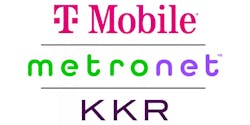T-Mobile advances fiber broadband play further with Metronet acquisition
T-Mobile has reached a deal to establish a joint venture with KKR to acquire fiber broadband provider Metronet. This move reflects the wireless operator’s ongoing desire to build a fiber-to-the-home (FTTH) business to complement its growing broadband arsenal.
The JV will acquire Oak Hill Capital’s existing stake as part of the deal. Oak Hill Capital will re-invest to retain a minority position, and founder John Cinelli will keep it once the deal closes.
After meeting customary closing conditions and regulatory approvals, the deal will close in 2025. At closing, T-Mobile is expected to invest approximately $4.9 billion to acquire a 50% equity stake in the JV and 100% of Metronet’s residential fiber retail operations and customers, as well as funding the JV.
So, what does T-Mobile get out of the deal?
Already reaching over 2 million homes and businesses across 17 states, Metronet has established itself as a critical independent FTTH player.
After the deal closes, Metronet will become a wholesale services provider for its retail customers, and 100% of its residential fiber retail operations and customers will transition to T-Mobile. T-Mobile will be fully responsible for residential customer acquisition and support, leveraging its differentiated retail, marketing, brand and service model. It will utilize Metronet’s deep digital and fiber infrastructure expertise to extend fiber services to more homes.
For its part, Metronet will focus on build plans, network engineering and design, network deployment, and customer installation. Following the closing of the deal, Metronet is expected to self-fund on a go-forward basis, and it is expected to reach 6.5 million homes by the end of 2030. To support this business plan, T-Mobile does not expect to make any additional capital contributions to the joint venture.
A complementary asset
T-Mobile sees its pending deal with KKR and Metronet as a way to add another element to its broadband toolbox.
It sees fiber broadband as complementary to its fixed wireless service.
“Metronet is the perfect partner for T-Mobile as a leader in fiber solutions with a breakneck build pace and a top-notch management team,” said Mike Sievert, CEO of T-Mobile. "Together with KKR’s strong heritage of corporate partnership and global fiber franchise, we will further expand the Un-carrier’s fiber footprint and deliver real value and choice to customers while addressing a growing demand for fast and reliable broadband."
This is the second major deal that T-Mobile has made for FTTH.
In April, the wireless operator announced a deal to acquire Lumos Networks for $1 billion through a joint venture with EQT. By 2026, the company plans to bring services to 2 million homes in underserved markets.
The JV will combine T-Mobile’s retail, marketing, brand, and customer experience strengths with EQT’s fiber infrastructure investment expertise.
Like Metronet, T-Mobile’s deal with Lumos, which currently reaches 320,000 households over 7,500 route miles with fiber-based internet and home wi-fi service in the Mid-Atlantic, will transition to a wholesale model with T-Mobile as the anchor tenant owning customer relationships and leveraging its brand to attract new subscribers.
KKR’s fiber investment focus
As a significant investor in broadband and fiber, KKR's key focus is developing its global infrastructure strategy.
Since it first established its global infrastructure strategy in 2008, KKR has managed over $61 billion in infrastructure assets. KKR has experience investing in the growth of FTTH providers globally, with over 25 million homes passed and more than four million built annually.
This includes creating independent open-access wholesale fiber optic network companies in Chile, Colombia, Peru, and the Netherlands and investments in Hyperoptic in the U.K., Telenor Fiber in Norway, and Deutsche Glasfaser in Germany. Most recently, KKR announced the closing of its acquisition of Telecom Italia Netco, which owns and operates the entire national copper and fiber fixed-line network in Italy.
KKR sees a similar opportunity with its Metronet purchase.
“Since its initial investment in Metronet in 2021, the company has proliferated, including constructing new fiber infrastructure and adding subscribers in attractive, underserved markets," said Waldemar Szlezak, partner and global head of digital infrastructure at KKR. "Our new joint venture with T-Mobile will be transformational for the future of the Metronet business.”
For related articles, visit the Broadband Topic Center.
For more information on high-speed transmission systems and suppliers, visit the Lightwave Buyer’s Guide.
To stay abreast of fiber network deployments, subscribe to Lightwave’s Service Providers and Datacom/Data Center newsletters.
About the Author
Sean Buckley
Sean is responsible for establishing and executing the editorial strategies of Lightwave and Broadband Technology Report across their websites, email newsletters, events, and other information products.


